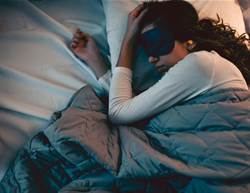From the time you eat dinner to when you finally flop into bed after a long day, the choices you make have a big difference to your circadian rhythm.
But what is it and why should we care? And what can we do to reset our circadian rhythm and get more sleep?
What is your circadian rhythm?
Think of your body having an internal clock. It gets input from light to help your body’s 24-hour cycle. It’s naturally aligned with the cycle of day and night. That’s your circadian rhythm.
Your body clock helps regulate your appetite, body temperature and hormones like melatonin, which help us sleep. Your circadian rhythm can also influence your gut, heart rate, skin healing, metabolism and mental health.
Certain common habits like scrolling on your phone before bed and getting to bed too late can mess up our circadian rhythm and your length and quality of sleep.
We speak to habit expert and dietician Dr Gina Cleo from Bond University on how to regulate your circadian rhythm and maintain a healthier routine.
1. Eat dinner at the right time
Australia is heading towards a late night dinner crisis, with new research from ready made delivery service, Youfoodz, revealing 11 million Aussies are sitting down to dinner between 7 and 10pm each day, up to four hours later than recommended.
The late night dinner crisis can be attributed to a lack of awareness and understanding of our circadian rhythms.
“Life can sometimes just get in the way, and we all find the excuse to push out the tasks that feel menial. However, it really is so important to set those earlier dinner times and maintain consistency, as it can significantly aid in syncing your internal clock,” says Dr Cleo.
So, what’s the best time to eat dinner?
“I would recommend finishing your meal at least three hours before you plan to sleep, around 6pm,” she says.
“Eating earlier helps the body fully process and digest food without it interfering with the restorative functions of sleep.”
If you have trouble having dinner on the table earlier, try a healthy meal delivery service or the meal prep hacks in this article.
2. Embrace the power of natural light
Ever wondered why bed feels so much comfier in the winter on those dark mornings? Well, natural light is a primary regulator of our circadian rhythm. This is why it’s so important we make sure we are embracing natural light as much as possible.
Natural light reduces melatonin (a sleep hormone) during the day, making us alert. When it's dark, melatonin increases, telling our body it's time to sleep.
“I recommend getting outside for at least 30 mins to one hour a day to flood your system with light, and the earlier you do this, the better. This natural light helps coordinate other body processes, like when to digest food or release hormones, ensuring everything works smoothly,” says Dr Cleo.
3. Curb the caffeine
“To ensure a good night's sleep, aim to have your last caffeinated drink at least six hours before your bedtime. This will give your body enough time to metabolise the caffeine and reduce its stimulating effects,” she says.
Don’t forget that caffeine is also in tea, chocolate and some soft drinks and energy drinks.
“For those afternoon cravings, ditch the caffeine for a natural pick-me-up. Select a drink which has natural ‘feel good’ properties.
“Ingredients like bananas contain nutrients including tryptophan, an amino acid which can help the body convert to the feel-good brain chemical serotonin. Blueberries are also bursting with antioxidants and vitamin C that may provide anxiety relief, allowing you to unwind towards the end of the working day."
Smoothies are a great way to pack in bananas, blueberries, or both. Try this blueberry and banana smoothie bowl recipe or this easy berry smoothie recipe.
4. Clean up your night with good sleep hygiene
Sorting out your sleep hygiene is an important way to reset your body clock.
Proper sleep hygiene practices, such as maintaining a consistent sleep schedule, will help stabilise and reinforce the natural function of your circadian rhythm.
“Good sleep hygiene is a great practice to develop habits that are necessary to have good nighttime sleep quality and full daytime alertness.
“Go to bed and wake up at the same time every day, even on weekends. This helps regulate your body's internal clock. It also allows you to plot regular meal times.”
Blue light is another common common culprit leading to poor sleep hygiene. While blue light is all around it, it’s the blue light from from electronic devices like TVs, phones and tablets that can mess with your circadian rhythm. So put away these devices at least 30 minutes before bedtime.
5. Exercise intense and early, or light and late
Exercise also plays an important role in regulating our circadian rhythms.
“Exercising in the evening can impact our rhythms by potentially delaying the production of the sleep hormone melatonin, particularly when it comes to high-intensity workouts. This can then have a negative effect on sleep, as you’re not receiving the melatonin you require.
“A simple fix for this is to save your high-intensity workouts for earlier in the day, and stick to lower-intensity ones like a walk or stretching at night.
"By creating a consistent routine to maintain your circadian rhythm, you can build healthy habits to help boost your sleep hygiene.”



.jpg&h=90&w=90&c=1&s=1)






